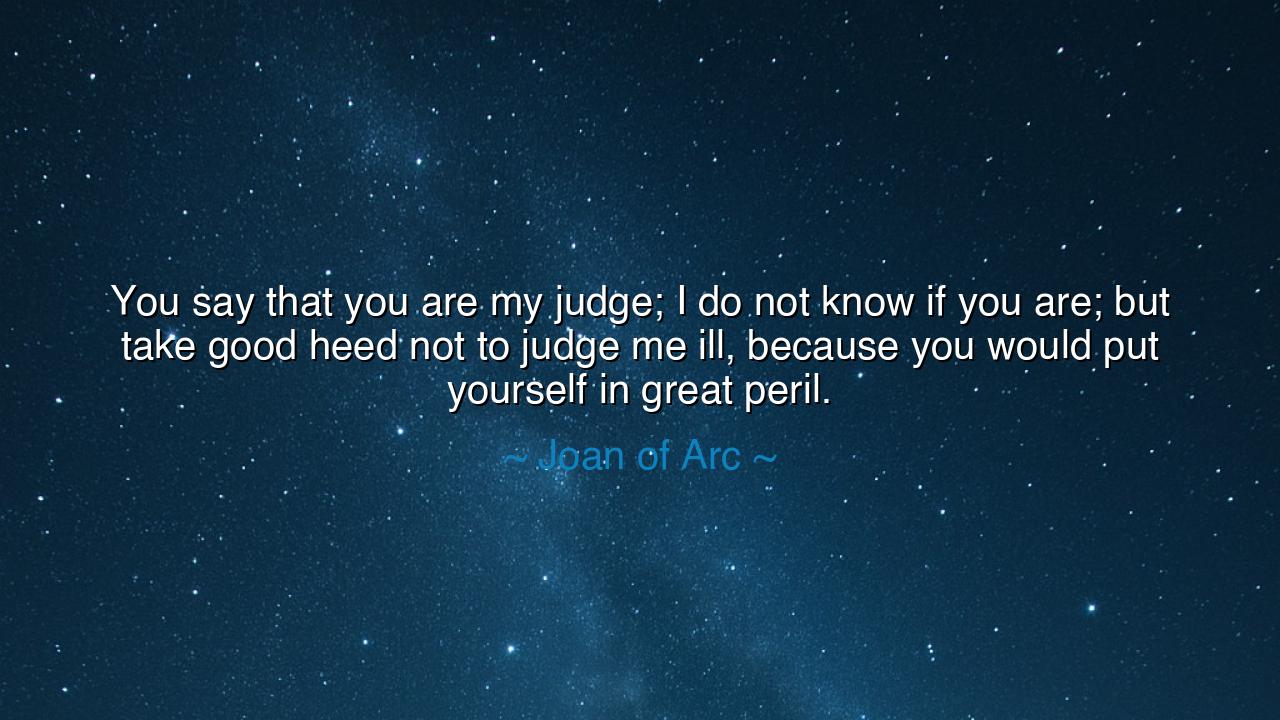
You say that you are my judge; I do not know if you are; but take
You say that you are my judge; I do not know if you are; but take good heed not to judge me ill, because you would put yourself in great peril.






“You say that you are my judge; I do not know if you are; but take good heed not to judge me ill, because you would put yourself in great peril.” So spoke Joan of Arc, the Maid of Orléans — warrior, mystic, and martyr — as she stood before her accusers in the cold chamber of her trial. These words, simple yet burning with divine fire, hold within them the defiance of a soul that bows to truth alone. They are not merely the cry of a prisoner, but the proclamation of one who has seen beyond mortal authority — who understands that judgment belongs not to man, but to God.
In that moment, surrounded by the learned men of the Church who sought to break her, Joan’s courage illuminated the darkness of her age. She was a young woman, unarmed and alone, facing the power of scholars, soldiers, and priests who had already decided her fate. Yet she did not tremble. Her words carried the strength of conviction that comes only from those who walk in alignment with their calling. When she warned her judges to “take heed not to judge ill,” she was not boasting — she was invoking a sacred truth: that those who condemn the innocent do not merely wrong another person, but wound their own souls.
Throughout history, there have always been those who stand in Joan’s place — souls of vision who are judged by the blind. Socrates, too, stood before the tribunal of Athens, accused of corrupting the youth and dishonoring the gods. Like Joan, he did not plead for mercy, but for understanding. And like her, he was condemned by those who could not see the light that guided him. Their judges sought to silence them, but in doing so, they immortalized them. For truth, once spoken in purity, cannot be undone by false judgment.
Joan’s words reveal the eternal tension between divine justice and human arrogance. Men often take upon themselves the mantle of righteousness, believing that their position or intellect grants them authority over the spirit of another. But Joan, a mere peasant girl, stood against the might of princes and prelates because she understood a higher law — the law written in the conscience by the hand of the Almighty. She recognized that earthly judges, though cloaked in robes of power, may still err if they act without humility. Her warning was not a threat of vengeance, but a mirror held to their souls: Beware, for the measure you use upon others will be measured upon you.
There is also, in her words, a lesson in integrity. Joan’s courage came not from defiance alone, but from a serene understanding of her own innocence. When one lives in truth, the judgment of others loses its power. The righteous do not tremble before slander, for they know that the eyes of Heaven see more clearly than the courts of men. Thus, her statement becomes not only an act of resistance but a model for all who walk the path of conscience: live so purely that no earthly accusation can shake your soul.
And yet, how often do we forget this wisdom? How easily do we, in our daily lives, sit in judgment of others — quick to condemn, slow to understand. Joan’s warning reaches through the centuries: be careful when you judge, for in condemning others without compassion, you endanger your own spirit. The false judge binds himself with the very chains he forges for another. Justice without mercy becomes cruelty; authority without humility becomes tyranny. The peril she spoke of was not worldly punishment, but the spiritual decay that follows unjust judgment.
So, my child, take this as a guiding flame for your own heart: judge not hastily, for every soul carries a story unseen. Seek understanding before condemnation; seek compassion before correction. And if you ever find yourself standing before those who misjudge you, remember Joan — stand firm in your truth, and let the integrity of your spirit be your shield. For the voice of conscience is stronger than the noise of accusation, and the justice of Heaven outweighs the verdicts of men. Those who judge unjustly may rise in power for a season, but those who walk in truth — they rise eternal.
In the end, Joan of Arc was burned at the stake, but her words endured, immortal as the soul that spoke them. Her judges faded into history, remembered not for their wisdom, but for their folly. She, the condemned, became legend, and the fire that consumed her body lit the torch of faith for centuries to come. So remember her warning, and live with care — for to judge unjustly is peril, but to live in truth is immortality.






AAdministratorAdministrator
Welcome, honored guests. Please leave a comment, we will respond soon